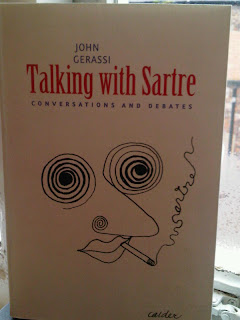I recently came across Talking with Sartre, a fascinating book of ‘conversations and debates’ between Jean-Paul Sartre and John Gerassi, recorded between 1970 and 1974. When I was sixteen I had a picture of Sartre stuck to my guitar, cut from his obituary, and a Penguin Modern Classic of The Age of Reason in my long-overcoat pocket. (Think I can be a bit much now, you should have met me then...) Sartre fell out of fashion – after the collapse of the Berlin Wall I guess, but probably also because he wasn’t as cool looking as Camus – but for me he still sat there in the background, till Hazel Rowley’s book on his relationship with Simone de Beauvoir Tête à Tête revived my interest in and respect for a peculiar and flawed man who struggled to find an authentic way to be in the world, coming to define a kind of engagement with ideas and politics – and writing.
I don’t have time or space for a ‘reassessment’ of Sartre, nor the philosophical knowledge. But I found this book of essays so stimulating I wanted to share a few tangential thoughts relating to arts and culture inspired by it, as well as letting those interested know about its existence.
- Making choices is central to authentic life, and always difficult. But avoiding them is childish romanticism. As Gerassi describes in an afterword, this is the essential difference between the two big existentialists Sartre and Camus. Camus refused choice – said No – which leads to the archetype of the rebel. (I prefer Marx’s formulation myself: ‘Whatever it is I’m against it.’ The Marx in question being Groucho, obviously.) Sartre said, in Gerassi’s words, ‘what we must do instead is commit ourselves over and over again. No act is pure. All acts are choices, which alienate some. No one can live without dirty hands. To be simply opposed is also to be responsible for not being in favour, for not advocating change.’ The relevance to today’s environment of cuts and choices is obvious. Especially for leaders, using commitment to avoid cynicism is especially key. What are we saying yes to? Also integral to Sartre’s reflections here is that you will get some of the choices wrong – but this is part of the process , just keeping making decisions in good faith. Acknowledging and respecting this is important.
- ‘There is no I without the we.’ This sums up my main argument with Richard Eyres’ recent article about cuts to the arts. Eyre says ‘Art is about the "I" in life not the "we", about private life rather than public. A public life that doesn't acknowledge the private is a life not worth having.’ I would say the reverse is more urgently true given this government’s policies – and much of the way we act as a society, to be fair to them for one second. Private life needs to acknowledge the public life more. And yes, people who spend your kids to private schools, I do mean you, sorry. So that sense of the social and collective I find very powerful.
- Sartre and De Beauvoir are famous for having an open relationship – they committed to each other as young people, saw each other every day, are buried next to each other, but had other lovers. They termed their own relationship as ‘necessary’ and the others as ‘contingent’, a term rich in meaning for Sartre. This was not always easy for them or their lovers – the great American novelist Nelson Algren famously couldn’t deal with being ‘contingent’ - but gave clarity if nothing else. In a recent discussion about partnerships and collaborations in the cultural sector it struck me that the idea of ‘necessary’ and ‘contingent’ partnerships might be helpful in at least managing conflicted feelings people seem to have about working with others. Which of your partnerships are for the long-term, even when they evolve, and which are contingent? A side thought is these interviews reveal Sartre to have been much less doctrinaire in who he would work with than one might suspect from his image – so long as they were working on the same cause. His emphasis on choice made him less rather than more ‘politically correct’ in his collaborations.
- A line that both Gerassi and Sartre refer to several times in their conversations is a quote from The Age of Reason ‘You don’t fight fascism because you’re going to win. You fight fascism because it is fascist.’ This links somehow to Havel’s distinction between hope and optimism: “Hope is not the conviction that something will turn out well but the certainty that something makes sense, regardless of how it turns out.” I find that a reassuring and enabling thought just now: pragmatic but the opposite of cynical.
Ok, enough. I will now go directly to Pseud's Corner, without passing go or collecting 200 francs...


Comments
Post a Comment